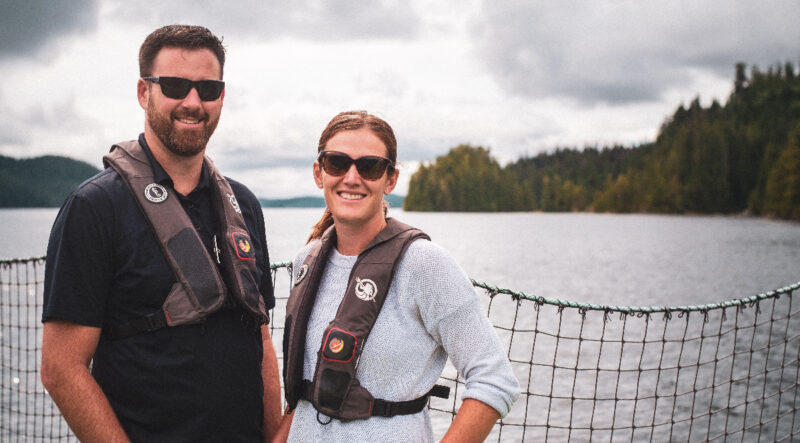Poseidon fights climate change at BC salmon farms
Vancouver Island designed aquaculture technology from Poseidon Ocean Systems helps salmon farmer cut 76,000 kg of CO2 emissions from their operations
By Fabian Dawson
SeaWestNews
Salmon farmers in British Columbia, already renowned as among the top sustainable protein producers globally, are getting a boost with locally designed technology that is helping the aquaculture industry further cut Carbon Dioxide (CO2) emission.
Cermaq Canada, one of BC’s largest salmon farmers, is reporting that it has cut over 76,000 kg of CO2 emissions from their marine operations last year using a new aeration technology supplied by the Campbell River-based Poseidon Ocean Systems.
The reduction in CO2 emissions, the primary driver of global climate change, was the result of trialing Poseidon’s new Flowpressor™ aeration compressor systems at two of Cermaq’s 16 operational farm sites in British Columbia.
The trial took place at the Simmonds Point and Wehlis Bay farms from May through November 2021, and involved using Flowpressors to power Cermaq’s standard Harmful Algae Bloom systems, instead of conventional diesel compressors.
“The trial demonstrated the viability of the Flowpressor technology to power our existing conventional bloom mitigation equipment, while producing 60% less greenhouse gas emissions.
The overall result is that we have slashed emissions and dramatically reduced our fuel costs while improving overall performance of the mitigation system” said Brock Thomson, Cermaq Canada’s Innovation Director.
“We’re thrilled with the results of the trial” said Matt Clarke, CEO and Co-Founder of Poseidon Ocean Systems.
“When we developed this technology we projected a 60% reduction in emissions while also improving the performance of their aeration systems, but I think it was fair for customers to be a bit sceptical of those claims. Now that we’ve delivered as promised, we couldn’t be happier. This is a result our engineering team can be very proud of.”
Poseidon’s Flowpressor technology was the recipient of Innovate BC’s first-ever Aquaculture Innovation Award in 2021, and based on that success, Poseidon was awarded a BC Fast Pilot Program grant of over $180,000 to develop an oxygen-generating variant of Flowpressor, dubbed Oxypressor, which fittingly will be trialed at a Cermaq site in early 2022.
“We expect that Poseidon can help Cermaq achieve the accomplishment of having the greenest life-support systems in the world,” said Clarke.
When it comes to mitigating Greenhouse Gas (GHG) emissions, salmon farmers and other aquaculture operations have been given top marks by the Coller FAIRR Protein Producer Index.
It is an especially important metric to counter the activist lobby in BC, which wants to oust salmon farmers from the oceans and replace their production with land-based operations.
In BC alone, moving the current production of Atlantic salmon to land based tanks will result in an increase 22,881,000 kgs of Greenhouse Gas (GhG) emissions. That is equivalent to the energy needed per year to power a population of 52,200 or a city the size of North Vancouver.
In addition, raising fish on land will move the industry away from coastal communities to bigger markets in the US and make BC raised salmon, which is the provinces top seafood export, valued at about $550 million annually, much more expensive.
The High Level Panel for a Sustainable Oceans Economy, to which Canada’s Prime Minister Justin Trudeau is a signatory, has said “the largest potential carbon reduction gains for food production lie in the sustainable expansion of marine aquaculture.”
Currently, B.C. ocean-based salmon farms emit only 2.2 kilograms of carbon dioxide for every kilogram of edible fish produced. That is less than half of any animal raised on land, including 5.1 kilograms of CO2 per kilogram of chicken, 6.4 kilograms for pork, and 37.2 kilograms for beef.
The BC Salmon Farmers Association (BCSFA) in a recent report emphasized that new technologies and innovations are being deployed at all stages of the salmon production life cycle – from land-based hatcheries, in-ocean farms to fish processing.
“B.C. is perfectly positioned to lead Canada’s Blue Economy, and we continue to aspire to that. Already, we are a leader in sustainable seafood production through innovation, improvements in environmental stewardship and working hand-in-hand with Indigenous and non-Indigenous communities,” said John Paul Fraser, Executive Director of the BCSFA.
The report updates features several companies operating in rural B.C. coastal communities developing, piloting, and implementing leading edge responsible technology that the B.C. salmon farming industry has adopted.
“B.C.’s homegrown technology is setting the standard around the world and as technology is piloted and matured in B.C., other salmon producing countries have taken notice and are adopting our expertise and leadership,” said Fraser.
(File image shows Poseidon Ocean System co-founders Matt and Heather Clarke in Campbell River, BC)

